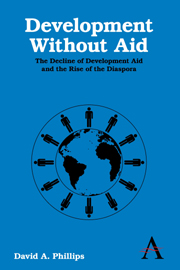Book contents
- Frontmatter
- Contents
- List of Acronyms
- Acknowledgments
- 1 Introduction: Motivation and Perspective
- 2 What Is Foreign Aid, Who Does It, Why and How Much Is There?
- 3 How Far Has Development Aid Been Effective?
- 4 Why Has Development Aid Done So Little?
- 5 Changing the Dynamics of Development
- 6 “New Aid”: New Ways to Promote and Finance Development?
- 7 Another Pathway Out of Poverty?
- 8 Exit Strategy – Replacing Foreign Assistance
- 9 Postscript
- Notes
- Index
8 - Exit Strategy – Replacing Foreign Assistance
Published online by Cambridge University Press: 05 July 2013
- Frontmatter
- Contents
- List of Acronyms
- Acknowledgments
- 1 Introduction: Motivation and Perspective
- 2 What Is Foreign Aid, Who Does It, Why and How Much Is There?
- 3 How Far Has Development Aid Been Effective?
- 4 Why Has Development Aid Done So Little?
- 5 Changing the Dynamics of Development
- 6 “New Aid”: New Ways to Promote and Finance Development?
- 7 Another Pathway Out of Poverty?
- 8 Exit Strategy – Replacing Foreign Assistance
- 9 Postscript
- Notes
- Index
Summary
Aid does work: it has brought real and profound benefits to poor people and increasingly so in recent years. … The dead aid thesis makes a valid point but should not define how we view development.
Tony Blair speaking at the Center for Global Development, 17 December 2010The Paris declaration fails to recognize the central paradox – that aid in itself undermines both state capacity and accountability.
Jonathan Glennie (2008)Some Elements of an Aid Disengagement Strategy
The experience of 50 years of aid shows that the donor countries in collaboration with the recipients must define far more clearly exactly where and how they can add value. They started to do something like that during the first decade of the 2000s at Monterrey, Rome, Paris, Accra and Busan; but after nearly 10 years of New Aid, the achievement has been small and the full implications of important changes in the dynamics of the international order have apparently not yet been absorbed.
One key implication of the new dynamic is that aid resources and diaspora resources are not necessarily complementary and may instead be to some extent mutually exclusive, with diaspora resources superseding aid resources. The surge in private transfers across the world and a growing partnership between the diasporas and many home countries may be a historic opportunity for a new impetus to development without aid, in Africa and the poorer countries of South Asia and Latin America.
- Type
- Chapter
- Information
- Development without AidThe Decline of Development Aid and the Rise of the Diaspora, pp. 167 - 176Publisher: Anthem PressPrint publication year: 2013



